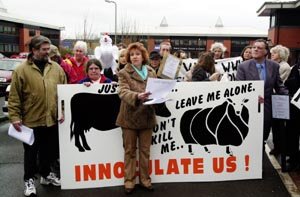Trust in Governance
[ Back to Analytical themes ]- Order/Chaos/Farce
- Punitive measures
- Health fears about disposal methods
- Hopes and fears for public inquiries
- Rural regeneration

You find yourself having to trust people or agencies you know little about and just hoping everything will be alright.
This theme was developed from a large body of data about trust, or lack of trust, in decision making during and following the crisis. The discourse spans all levels of "authority", decision making and management and many respondents were concerned about ways of resolving these problems and preventing any recurrence of the disaster. The widespread perception of government and management failure in the early stages of the epidemic, led to mistrust in governance as a whole, which manifested in conspiracy theories, viewing ‘clean up’ operations as punitive and the questioning and challenging of more contentious policies such as disposal methods. Differences between reports from London about the epidemic being ‘under control’ and what local people could see happening on the ground such as piles of dead animals lying uncollected for up to ten days, undermined credibility and trust in governance. The extract below is from a diary entry as the research was closing, i.e. summer 2003, indicating that the erosion of trust in governance continues to be a problem.
I don’t think it will happen but DEFRA London, or where ever, will have to trust local knowledge and locals will have to trust DEFRA or whoever is in charge. The reason I don’t think it will happen because after all that has happened over the last two years, all trust has gone.
(Agricultural related, diary, 2003)
Site Design by FractalWeb with the generous support of Cumbria County Council